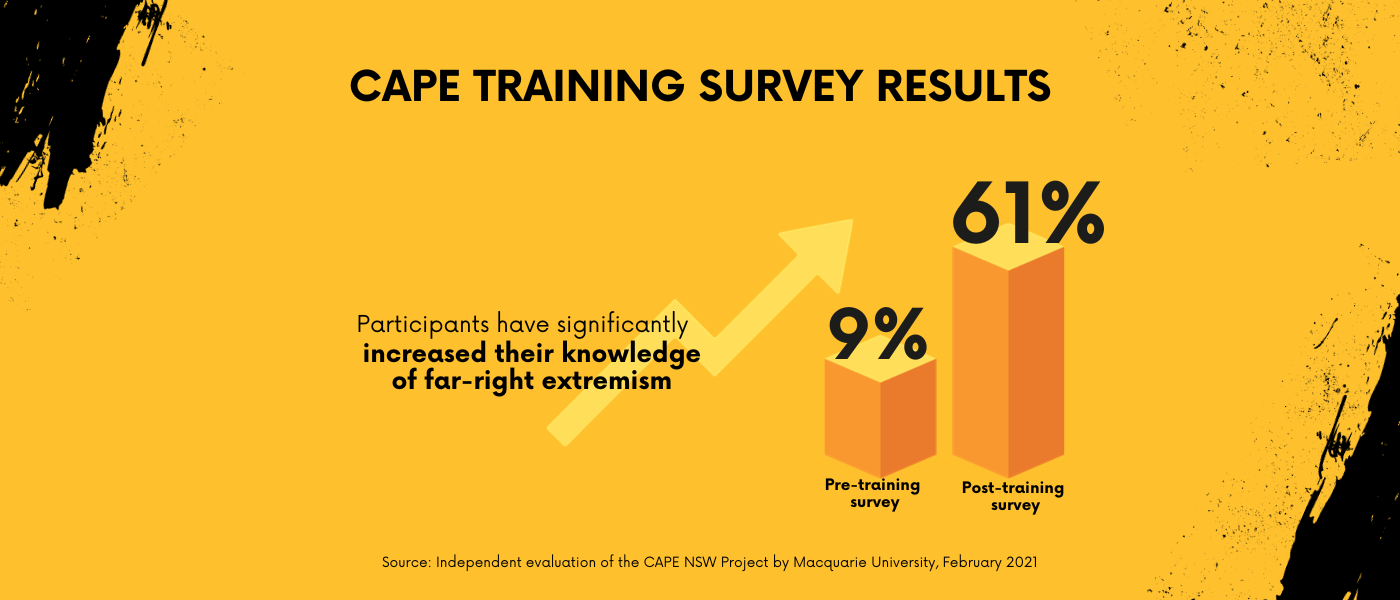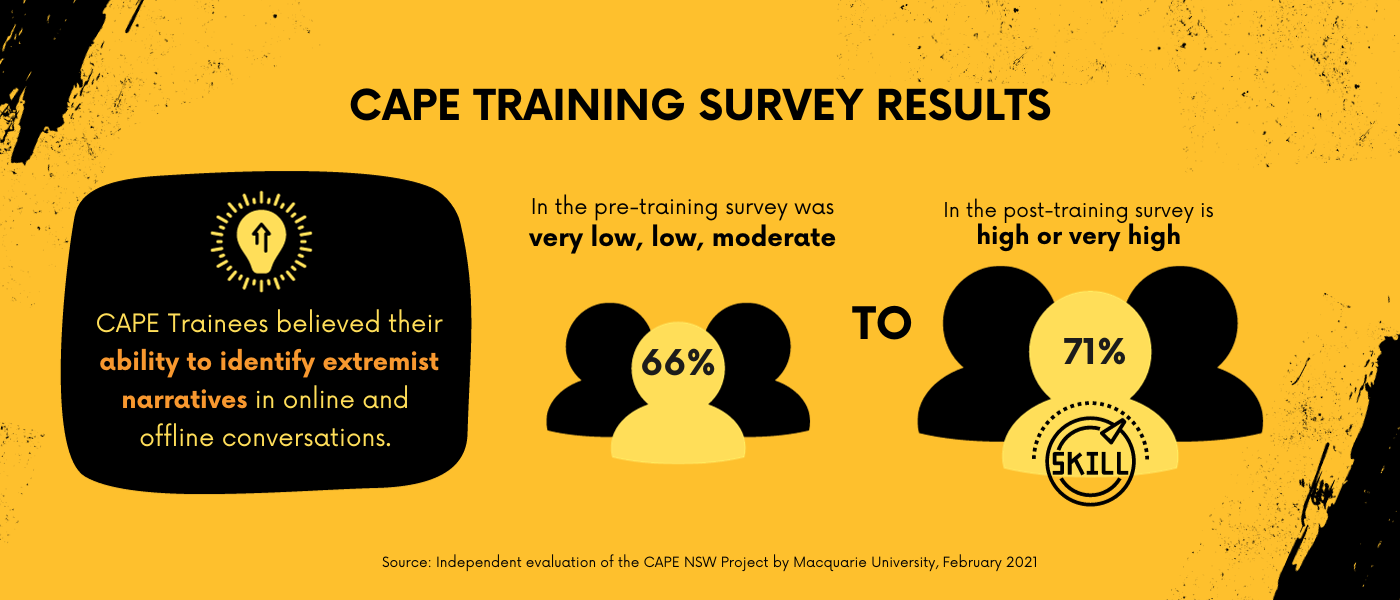Why do we need training to challenge far-right extremism?
Racism, hate and extremism are important issues facing young people today.
Young people and adults are routinely targeted online by far-right extremist groups, networks and individuals promoting hateful and violent ideas, narratives and conspiracy theories. Research shows that the adoption of extremist views is a gradual process, which is best responded to early.
People within the community who are in regular contact with the individual are ideally placed to notice changes in a person’s behaviour and to intervene early. For example: council workers, teachers, counsellors, youth workers, parents, and community workers. Our updated training will equip you with the necessary skills to effectively address complex issues in our society.
Subscribe to our newsletter to be the first to know about upcoming trainings, resources and exciting developments. New training dates will be announced soon!
Free Guide – Recognise & Prevent Extremist Behaviour Early.
Why choose our training?
All Together Now has been working to undermine far-right extremism in Australia since 2012. Formerly known as EXIT White Power, the Community Action for Preventing Extremism (CAPE) project has been spearheading our ongoing work in promoting community resilience to far-right extremism.
In February 2021, All Together Now published a report detailing the results of the final two years of the NSW CAPE project (2018-2020), supported by Multicultural NSW and in partnership with Youth Action and the Challenging Racism Project at Western Sydney University. This report included an independent evaluation by Macquarie University which concluded that the CAPE program had “in all cases met and surpassed” expectations, as well as established “a high degree of institutional expertise, experience, and capacity that is world-leading in the space of countering far-right extremism”. Our countering far-right extremism workshops (Identifying and Responding to Far-Right Extremism) currently open to the public are based on the independently evaluated CAPE training program.
All Together Now experts constantly update the content of the workshops in order to reflect the fast-changing landscape of right-wing extremism in Australia and internationally.
Additionally, in late 2023 our experts undertook a major review and update of the training program in cooperation with Associate Professor Mario Peucker of Victoria University. Dr Peucker is an international expert on far-right extremism. He is a Principal Research Fellow at the Institute for Sustainable Industries and Liveable Cities at Victoria University and an executive member of the Centre for Resilient and Inclusive Societies (CRIS).
At All Together Now we believe the need for innovation never rests. The landscape and threat analysis of far-right extremist activity is complex and always in flux. Reviewing and updating the program regularly ensures that the training package, including the training content, activities and practical tools, are re-calibrated to and fully aligned with the latest evidence, trends, developments, insights and methodologies that are available from the research and community experiences.
Our trainings have helped hundreds of frontline workers…
What to expect
All Together Now’s interactive programs on countering far-right extremism training are designed in two parts.

Workshop 1 – Identifying Far-Right Extremism
to provide participants with a nuanced understanding of far-right extremism in an Australian and international context.

Workshop 2 – Responding to Far-Right Extremism
which provides guidance on how to respond to young people and adults in the early stages of engagement with right-wing extremism.
Our programs and interventions are informed by the observation that far-right extremism produces different forms of hate and violence that are both deep-rooted and intersectional. Read further on what you’ll learn in each training and book online or register your interest. These trainings are delivered online via Zoom. Group trainings for staff can also be organised privately and face-to-face. Scroll down for more information.
Workshop 1 – Identifying Far-Right Extremism
This training provides participants with a comprehensive overview of the spectrum of far-right extremist hate and violence, both internationally and in Australia. It looks at the different ideological tendencies within the spectrum and provides a scan of the landscape of the most important far-right extremist groups, networks and channels. Through activity-based learning, participants learn how far-right extremist groups recruit, both online and offline, and who is most at risk of being recruited.
This workshop will be beneficial to anyone who is interested to learn more about how hateful and violent far-right ideologies and movements impact on young people and adults in Australia today.
What you will learn from this training
- Identify far-right extremist messaging and narratives
- Recognise far-right extremist groups, channels, platforms, influencers and networks
- Identify how far-right extremists recruit, who is at risk, and how the ideologies are spread online
- Build an understanding of the link between far-right extremist ideologies such as the alt-right, neo-Nazism and white nationalism
- Dive deeper into current trends and developments and learn about the threat of sub-ideologies including accelerationism, Odinism, eco-fascism, the sovereign citizens’ movement as well as the incel movement.
- Learn about the intersectional nature of far-right extremist hate and violence, including racism, misogyny, Islamophobia, anti-Semitism, anti-LGBTQIA+ hate and ableism
Training Dates
- Subscribe to our newsletter for updates on our programs and resources. Other training dates will be announced soon!
- If you require our workshops to be delivered to your whole team or organisation, please contact us via the form below.
Workshop 2 – Responding to Far-Right Extremism
This training is a follow-up workshop from our ‘Identifying Far-Right Extremism’ workshop. We strongly recommend that you complete this training only after doing the ‘Identifying Far-Right Extremism’ training.
Participants will learn how to use a range of assessment tools and response models that allow them to quickly and reliably assess how vulnerable and at-risk a young person or adult might be to engaging with far-right extremism. These tools and models also assist frontline workers to formulate responses and engage appropriately and effectively with the young person or adult.
While anyone who is interested in building their skills to respond to far-right extremist hate will benefit from this workshop, this session is specifically intended for frontline workers (e.g. social workers, teachers, youth workers, counsellors…) who are in contact with young people or adults who might be at risk of hateful behaviour and/or involvement in right-wing extremism.
What you will learn from this training
- Recognise, analyse and deconstruct far-right extremist messaging and narratives
- Address complex and controversial topics with young people
- Recognise worrying signs and behaviours
- Increase your confidence in engaging with young people and adults who may have racist or hateful views and/or are at risk of engaging with far-right extremism
- Build connections with other people concerned about the rise of far-right extremism
Training Dates
- Subscribe to our newsletter for updates on our programs and resources. Other training dates will be announced soon!
- If you require our workshops to be delivered to your whole team or organisation, please contact us via the form below.
CONTACT US
For more information about our trainings or tailored programs to meet your team or organisational needs, please get in touch via the form to start a conversation!
Looking for face-to-face or personalised training?
If you require our workshops to be delivered to your whole team or organisation (online or at a venue of your choice), please contact us via the form for more information.
Reviews
“It was informative, impactful and insightful. The facilitators were both excellent. They were warm engaging and knowledgeable. They also did really well in an online forum to still feel connected- thank you :)”
Naomi Steinborner, Blue Sky Community Services
“This covered so much and explained a lot in a safe forum. Difficult material well presented and explained.”
Rachel Hennessey, NSW Department of Education
“Really thorough and informative. Knowledge of different groups and ideologies and techniques used to spread their messages and recruit members.”
Carolyn, NSW Department of Education
“Feeling empowered to use a range of strategies to assess young people for their levels of ‘risk’ of being influenced by an extremist group and strategies to engage and challenge young people who display learnings towards the far right.”
Kate Xavier – Responding to Far-Right Extremism Training (29 June 2021)
FAQs
How real is the far-right threat in Australia?
Right-wing extremist groups, individuals and movements have been active in Australia for a long time. Today there are many far-right extremist groups operating in Australia with links to other groups overseas. In 2019 the Christchurch terror attacks on two Islamic congregations killed 51 innocent people. This terror act was committed by an Australian who openly showed support online for far-right extremist groups in Australia which are currently still active. Recently ASIO revealed that approximately 30-40% of its counter terrorism case load work involved far-right extremism, and that this was an increase from approximately 10 and 15 per cent prior to 2016. Given these factors it is fair to say that the threat of far-right extremism in Australia is real, significant and growing.
Why is training required to counter far-right extremism?
Far-right extremism is a real and growing threat. Young people are more at risk of being radicalised by far-right extremist content and groups. The path towards extremism is gradual and early intervention is best. To intervene early you need to have an understanding of the landscape and the factors involved. This training will provide you with that understanding. You should particularly do this training if you are concerned about young people or adults you work with who might be engaging with any form of far-right extremism, including hateful ideas or narratives or if you simply want to enhance your understanding of the far-right extremist landscape in Australia.
Who is the training for?
Our training will benefit anyone who is interested in learning more about far-right extremism and in enhancing their skills to respond to hate and extremism, both online and offline. Our training is particularly useful for professionals who work directly with vulnerable or at-risk young people or adults, e.g. frontline workers, youth workers, teachers, counselors, social workers etc., but is also highly relevant for policy workers or managers who want and need to understand how professional staff need to support and deal with young people and adults who are at risk of engagement with problematic, hateful or extremist behaviours.
Do I need prior knowledge of far-right extremism before I do the training?
You do not need prior knowledge to attend the ‘Identifying Far-Right Extremism’ training. However, we strongly recommend that you complete the ‘Identifying Far-Right Extremism’ training prior to doing the ‘Responding to Far-Right Extremism’ training.
Is the “Identifying far-right extremism” training module necessary to do before the “Responding to far-right extremism” training?
We strongly recommend doing both modules, one after another (‘Responding to far-right extremism’ training followed by the ‘Identifying Far-Right Extremism’ workshop) unless you have prior far-right extremism knowledge.
What is the instruction style – are there any group exercises, or will be it be like a lecture-style presentation?
Our training is interactive and will be delivered in a workshop style with group/individual exercises. We foster a safe, open, nuanced and inclusive learning environment and use activity-based and peer-to-peer based learning methodologies.
When will I receive my Zoom link?
Approximately one week before the training, you will receive a reminder email with the date and time of the training including the link to log in to the online workshop.
I can’t make the date anymore, can I get a refund?
You can get a refund up to seven days before the date of the event.
I can’t make the date anymore, can I attend another training?
Yes, we can place you in another training. Please contact us at [email protected] at least 48h prior to the training date.
Can I transfer my ticket to a friend or colleague?
No, you cannot transfer your ticket to another person.
Can somebody under 18 years old do the far-right extremism training?
No.





